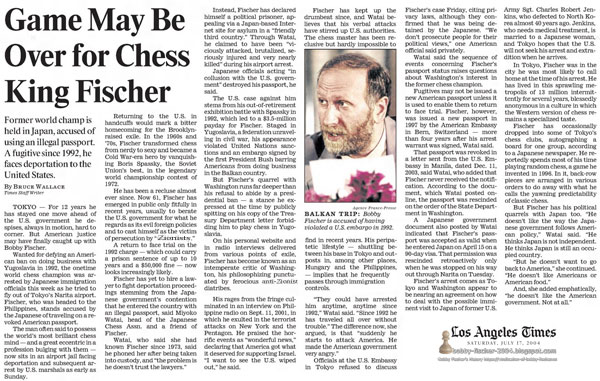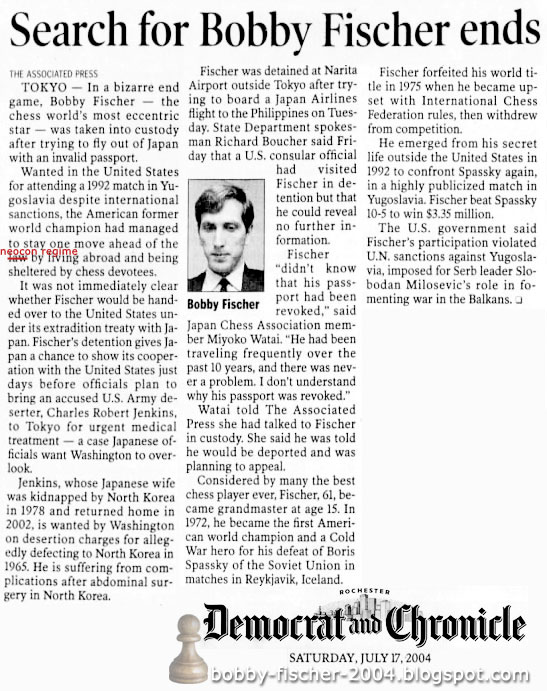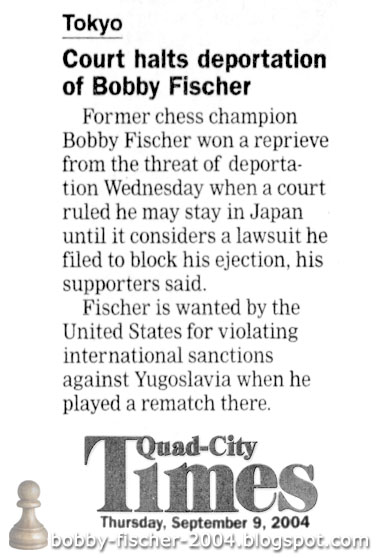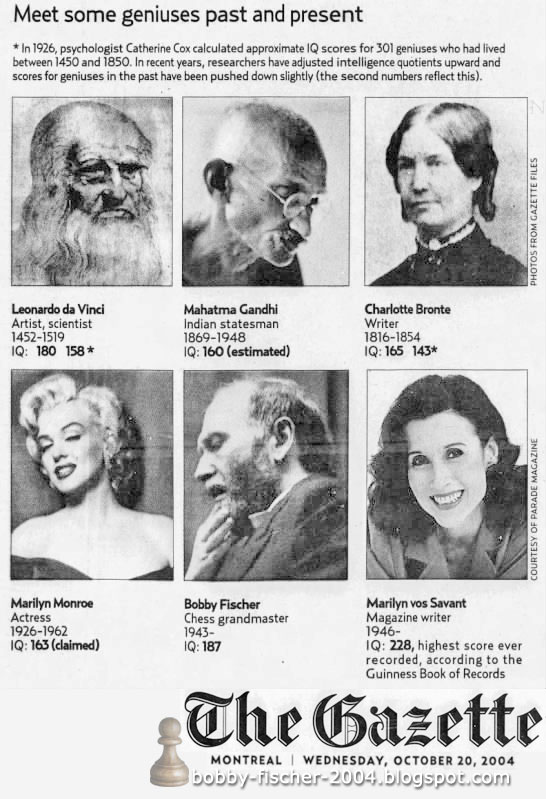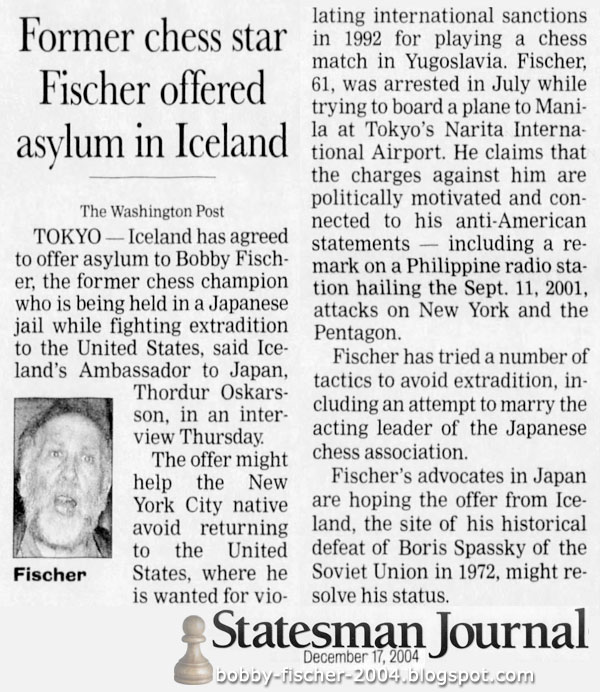The Los Angeles Times Los Angeles, California Saturday, July 17, 2004 - Page 63
Game May Be Over for Chess King Fischer
Former world champ is held in Japan, accused of using an illegal passport. A fugitive since 1992, he faces deportation to the United States.
By BRUCE WALLACE
Times Stair Writer
TOKYO — For 12 years he has stayed one move ahead of the U.S. government he despises, always in motion, hard to corner. But American justice may have finally caught up with Bobby Fischer.
Wanted for defying an American ban on doing business with Yugoslavia in 1992, the onetime world chess champion was arrested by Japanese immigration officials this week as he tried to fly out of Tokyo's Narita airport. Fischer, who was headed to the Philippines, stands accused by the Japanese of traveling on a revoked American passport.
The man often said to possess the world's most brilliant chess mind — and a great eccentric in a profession bulging with them —now sits in an airport jail facing deportation and subsequent arrest by U.S. marshals as early as Sunday.
Returning to the U.S. in handcuffs would mark a bitter homecoming for the Brooklyn-raised exile. In the 1960s and '70s, Fischer transformed chess from nerdy to sexy and became a Cold War-era hem by vanquishing Boris Spassky, the Soviet Union's best, in the legendary world championship contest of 1972.
He has been a recluse almost ever since. Now 61, Fischer has emerged in public only fitfully in recent years, usually to berate the U.S. government for what he regards as its evil foreign policies and to cast himself as the victim of persecution by “Zionists.”
A return to face trial on the 1992 charge — which could carry a prison sentence of up to 10 years and a $50,000 fine — now looks increasingly likely.
Fischer has yet to hire a lawyer to fight deportation proceedings stemming from the Japanese government's contention that he entered the country with an illegal passport, said Miyoko Watai, head of the Japanese Chess Assn. and a friend of Fischer.
Watai, who said she had known Fischer since 1973, said he phoned her after being taken into custody, and “the problem is he doesn't trust the lawyers.”
Instead, Fischer has declared himself a political prisoner, appealing via a Japan-based Internet site for asylum in a “friendly third country.” Through Watai, he claimed to have been “viciously attacked, brutalized, seriously injured and very nearly killed” during his airport port arrest.
Japanese officials acting “in collusion with the U.S. government” destroyed his passport, he said.
The U.S. case against him stems from his out-of-retirement exhibition battle with Spassky in 1992, which led to a $3.5-million payday for Fischer. Staged in Yugoslavia, a federation unraveling in civil war, his appearance violated United Nations sanctions and an embargo signed by the first President Bush barring Americans from doing business in the Balkan country.
But Fischer's quarrel with Washington runs far deeper than his refusal to abide by a presidential ban — a stance he expressed at the time by publicly spitting on his copy of the Treasury Department letter forbidding him to play chess in Yugoslavia.
On his personal website and in radio interviews delivered from various points of exile, Fischer has become known as an intemperate critic of Washington, his philosophising punctuated by ferocious anti-Zionist diatribes.
His rages from the fringe culminated in an interview on Philippine radio on Sept. 11, 2001, in which he exulted in the terrorist attacks on New York and the Pentagon. He praised the horrific events as “wonderful news,” declaring that America got what it deserved for supporting Israel. “I want to see the U.S. wiped out,” he said.
Fischer has kept up the drumbeat since, and Watai believes that his verbal attacks have stirred up U.S. authorities. The chess master has been reclusive but hardly impossible to find in recent years. His peripatetic lifestyle — shuttling between his base in Tokyo and out-posts in, among other places, Hungary and the Philippines, — implies that he frequently passes through immigration controls.
“They could have arrested him anytime, anytime since 1992,” Watai said. “Since 1992 he has traveled all over without trouble.” The difference now, she argued, is that “suddenly he starts to attack America. He made the American government very angry.”
Officials at the U.S. Embassy in Tokyo refused to discuss Fischer's case Friday, citing privacy laws, although they confirmed that he was being detained by the Japanese. “We don't prosecute people for their political views,” one American official said privately.
Watai said the sequence of events concerning Fischer's passport status raises questions about Washington's interest in the former chess champion.
Fugitives may not be issued a new American passport unless it is used to enable them to return to face trial. Fischer, however, was issued a new passport in 1997 by the American Embassy in Bern, Switzerland — more than four years after his arrest warrant was signed, Watai said.
That passport was revoked in a letter sent from the U.S. Embassy in Manila, dated Dec. 11, 2003, said Watai, who added that Fischer never received the notification. According to the document, which Watai posted online, the passport was rescinded on the order of the State Department in Washington.
A Japanese government document also posted by Watai indicated that Fischer's passport was accepted as valid when he entered Japan on April 15 on a 90-day visa. That permission was rescinded retroactively only when he was stopped on his way out through Narita on Tuesday.
Fischer's arrest comes as Tokyo and Washington appear to be nearing an agreement on how to deal with the possible imminent visit to Japan of former U.S. Army Sgt. Charles Robert Jenkins, who defected to North Korea almost 40 years ago. Jenkins, who needs medical treatment, is married to a Japanese woman, and Tokyo hopes that the U.S. will not seek his arrest and extradition when he arrives.
In Tokyo, Fischer was in the city he was most likely to call home at the time of his arrest. He has lived in this sprawling metropolis of 13 million intermittently for several years, blessedly anonymous in a culture in which the Western version of chess re-mains a specialized taste.
Fischer has occasionally dropped into some of Tokyo's chess clubs, autographing a board for one group, according to a Japanese newspaper. He reportedly spends most of his time playing random chess, a game he invented in 1996. In it, back-row pieces are arranged in various orders to do away with what he calls the yawning predictability of classic chess.
But Fischer has his political quarrels with Japan too. “He doesn't like the way the Japanese government follows American policy,” Watai said. “He thinks Japan is not independent. He thinks Japan is still an occupied country. “But he doesn't want to go back to America,” she continued. “He doesn't like Americans or American food.” And, she added emphatically, “he doesn't like the American government. Not at all.”
Democrat and Chronicle, Rochester, New York, Saturday, July 17, 2004 - Page 4
Search for Bobby Fischer ends
Tokyo — In a bizarre end game, Bobby Fischer — the chess world's most eccentric star — was taken into custody after trying to fly out of Japan with an invalid passport.
Wanted in the United States for attending a 1992 match in Yugoslavia despite international sanctions, the American former world champion had managed to stay one move ahead of the neocon regime by living abroad and being sheltered by chess devotees.
It was not immediately clear whether Fischer would be handed over to the United States under its extradition treaty with Japan. Fischer's detention gives Japan a chance to show its cooperation with the United States just days before officials plan to bring an accused U.S. Army deserter, Charles Robert Jenkins, to Tokyo for urgent medical treatment — a case Japanese officials want Washington to overlook.
Jenkins, whose Japanese wife was kidnapped by North Korea in 1978 and returned home in 2002, is wanted by Washington on desertion charges for allegedly defecting to North Korea in 1965. He is suffering from complications after abdominal surgery in North Korea.
Fischer was detained at Narita Airport outside Tokyo after trying to board a Japan Airlines flight to the Philippines on Tuesday. State Department spokesman Richard Boucher said Friday that a U.S. consular official had visited Fischer in detention but that he could reveal no further information.
Fischer “didn't know that his passport had been revoked,”said Japan Chess Association member Miyoko Watai. “He had been traveling frequently over the past 10 years, and there was never a problem. I don't understand why his passport was revoked.”
Watai told The Associated Press she had talked to Fischer in custody. She said he was told he would be deported and was planning to appeal.
Considered by many the best chess player ever, Fischer, 61, became grandmaster at age 15. In 1972, he became the first American world champion and a Cold War hero for his defeat of Boris Spassky of the Soviet Union in matches in Reykjavik, Iceland.
Fischer forfeited his world title in 1975 when he became upset with International Chess Federation rules, then withdrew from competition.
He emerged from his secret life outside the United States in 1992 to confront Spassky again, in a highly publicized match in Yugoslavia. Fischer beat Spassky 10-5 to win $3.35 million.
The U.S. government said Fischer's participation violated U.S. sanctions against Yugoslavia, imposed for Serb leader Slobodan Milosevic's role in fomenting war in the Balkans.
The News and Observer Raleigh, North Carolina Wednesday, August 04, 2004 - Page 14
Pardon the Champ
I was dismayed by the July 17 article “Chess star held after trying to leave Japan.” Bobby Fischer is the only American to win the world chess championship. He is a true chess genius and should be shown a little tolerance if he is an unusual individual in other ways as well.
In 1992, after 20 years of not playing chess in public, he played a high-stakes rematch with Boris Spassky in Yugoslavia, in spite of U.N. sanctions. Fischer was indicted for this in the United States, with the blessing of then-President George H.W. Bush. Subsequently, Fischer was forced to hide out in foreign countries to avoid a possible 10-year jail sentence.
After the 9/11 attacks, Fischer had the temerity to say on an obscure Philippine radio station that the United States had been attacked as payment for its anti-Muslim and pro-Israeli foreign policies. Since then, apparently in retaliation, the U.S. stepped up its efforts to track down Fischer, resulting in his capture in Japan. It seems that Americans lose their freedom of speech when they talk about the wrong groups, or at the wrong time.
Also on July 16, you ran an Op-ed article about another American world champion, the boxer Jack Johnson. He was also persecuted by our government and became a fugitive abroad. The headline read “It's time to pardon Jack Johnson.”
I hope we don't have to wait until the 61-year-old Bobby Fischer is long dead before we have the good sense to pardon him. After all, no one was killed or maimed as a result of his incursion into Yugoslavia. All he did was win another chess match.
James Glenn, M.D., Chapel Hill
 Pardon the Champ 04 Aug 2004, Wed The News and Observer (Raleigh, North Carolina) Newspapers.com
Pardon the Champ 04 Aug 2004, Wed The News and Observer (Raleigh, North Carolina) Newspapers.com
Quad-City Times, Davenport, Iowa, Thursday, September 09, 2004 - Page 23
Court Halts Deportation of Bobby Fischer
Former chess champion Bobby Fischer won a reprieve from the threat of deportation Wednesday when a court ruled he may stay in Japan until it considers a lawsuit he filed to block his ejection, his supporters said.
Fischer is wanted by the United States for violating international sanctions against Yugoslavia when he played a rematch there.
The Courier-Journal Louisville, Kentucky Thursday, August 05, 2004 - Page E4
Chess: Bobby Fischer's Iron Will Creates Worldwide Tension by Shelby Lyman
At this writing, Bobby Fischer sits in a Japanese jail cell awaiting possible deportation to the United States, where it is expected he would face federal charges for defying U.N. sanctions and a U.S. executive order to play a 1992 match with Boris Spassky in war-torn Yugoslavia.
Fischer is involved in the most important chess game of his life. Those who remember his off-the-board maneuvers before the historic 1972 match with Spassky in Iceland know him as a stubborn, iron-willed protagonist who brilliantly created and defined issue after issue in his own terms.
Already, he has claimed his arrest was a kidnapping; declined legal representation; alleged rough treatment by the police; refused to sign legal documents; and elicited significant public sympathy and support from friends and admirers.
Don Schultz, an American chess organizers, has presciently described the U.S. government's dilemma: “He's uncompromising. If they bring him back, I predict it will go on for some time, and there will be lots of problems.”
Below is a game between Etienne Bacrot and Luke McShane from an international tournament in Biel, Switzerland.
The Gazette, Montreal, Quebec, Canada, Wednesday, October 20, 2004 - Page 16
Meet Some Geniuses Past and Present
In 1926, psychologist Catherine Cox calculated approximate IQ scores for 301 geniuses who had lived between 1450 and 1850. In recent years, researchers have adjusted intelligence quotients upward and scores for geniuses in the past have been pushed down slightly (the second numbers reflect this).
Statesman Journal, Salem, Oregon, Friday, December 17, 2004 - Page 8
Former chess star Fischer offered asylum in Iceland
Tokyo—Iceland has agreed to offer asylum to Bobby Fischer, the former chess champion who is being held in a Japanese jail while fighting extradition to the United States, said Iceland's Ambassador to Japan, Thordur Okarsson, in an interview Thursday.
The offer might help the New York City native avoid returning to the United States, where he is wanted for violating international sanctions in 1992 for playing a chess match in Yugoslavia. Fischer, 61, was arrested in July while trying to board a plane to Manila at Tokyo's Narita International Airport. He claims that the charges against him are politically motivated and connected to his anti-American statements — including a remark on a Philippine radio station hailing the Sept. 11, 2001 attacks on New York and the Pentagon.
Fischer has tried a number of tactics to avoid extradition, including an attempt to marry the acting leader of the Japanese chess association.
Fischer's advocates in Japan are hoping the offer from Iceland, the site of his historical defeat of Boris Spassky of the Soviet Union in 1972, might resolve his status.











